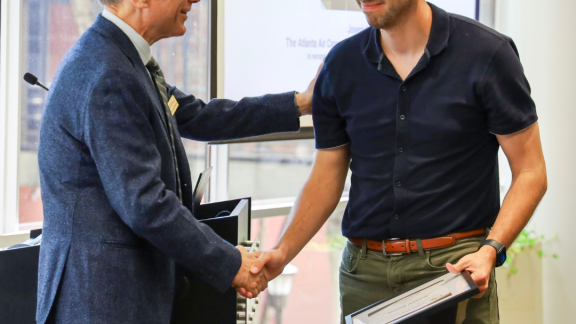
Five Ph.D. students from Georgia Tech’s School of Cybersecurity and Privacy graduated in Spring 2025, contributing significant research in software security, cryptography, and privacy with 34 published papers. Highlights include Ammar Askar’s concolic execution tools, Zhengxian He’s industry collaboration, Stanislav Peceny’s advances in multiparty computation, Qinge Xie’s adaptability across domains, and Yibin Yang’s award-winning work on zero-knowledge proofs. Faculty mentors played key roles in supporting their success.

As a third generation Yellow Jacket, Melina Sharp prepares for graduation and a career in data science, while sharing the key intergenerational connection and growth within Industrial and Systems Engineering.

For Tai’Re Barashango, the journey toward computer science (CS) began early, sparked by Lego Mindstorms, a curious mind, and inspiration from his father.
“Growing up, my father taught CS at the high school level,” Tai’Re said. “He never pushed it on me, but I’d visit his office and see what he was working on. Just being around it got me interested.”

The dictionary is the only place where success comes before work. The College of Computing’s 34th Annual Awards Celebration on April 8 offered a venue to honor the hard work and ensuing success of students, faculty, staff, and alumni in 2024-2025.
“In this past year, my first as the dean of computing, I have seen exactly how much work it takes from everyone to keep this community going, not to mention excelling,” said Vivek Sarkar, dean and John P. Imlay Jr. Chair of the College of Computing.
“We are strong across the board, and that makes our winners all the more impressive.”
The School of Computational Science and Engineering (CSE) is one unit that reinforces the College’s emphasis on collaboration, problem solving, and excellence. By earning awards this year at the College, Institute, and levels beyond, the School of CSE continues to distinguish itself as a top-tier department for research and learning.

Alexander Divoux, a mathematics and computer science major, is among the recipients of the 2025 Provost's Academic Excellence Awards.

Cotsman stood out among thousands of students at the Institute for her work with AI and machine learning to improve policymaking.

A Georgia Tech alum’s dissertation introduced ways to make artificial intelligence (AI) more accessible, interpretable, and accountable. Although it’s been a year since his doctoral defense, Zijie (Jay) Wang’s (Ph.D. ML-CSE 2024) work continues to resonate with researchers.
Wang is a recipient of the 2025 Outstanding Dissertation Award from the Association for Computing Machinery Special Interest Group on Computer-Human Interaction (ACM SIGCHI). The award recognizes Wang for his lifelong work on democratizing human-centered AI.

Chemistry major Matthew Rohan and biomedical engineering major Anirudh Sriram were awarded the prestigious Barry Goldwater Scholarship for exceptional academic achievements and dedication to STEM research.

This month, the H. Milton Stewart School of Industrial and Systems Engineering (ISyE) honored students with awards for their exceptional contributions. Graduate students received multiple awards and fellowships for their quality and positive performance over the past year.
The H. Milton Stewart School of Industrial and Systems Engineering at Georgia Tech has been ranked as the top graduate program for the 35th consecutive year, and its undergraduate program is also ranked No. 1 for 24 years in a row, contributing to the College of Engineering's overall high rankings and continued investment in facilities and research.

Grace Driskill made Georgia Tech history when she arrived on campus in 2023. She is the first student-athlete to study computational science and engineering (CSE). While this is a notable benchmark, Driskill’s achievements on the track and in the classroom defined her career at Georgia Tech.
As a competitive runner, Driskill holds the fourth-fastest 3000-meter time in the history of Georgia Tech’s women's indoor track program. Off the track, Driskill is a three-time All-ACC Academic team honoree on the women’s cross-country and track teams, and in 2024, she received the College of Computing’s Donald V. Jackson Fellowship.
We caught up with Driskill to learn more about her and how she balances academic and athletic responsibilities.

Grace Driskill has spent the last three years defining excellence at Georgia Tech. Between coding algorithms to setting running records, achievement has followed Driskill everywhere she has gone throughout her collegiate career.
Driskill came to Georgia Tech in 2023 as a graduate transfer to run long-distance for the women’s cross country and track teams. In doing so, she became the first-ever student-athlete in the School of Computational Science and Engineering (CSE).
While a pioneer in her own right, the trails that Driskill blazed will be her legacy at Georgia Tech and the School of CSE.